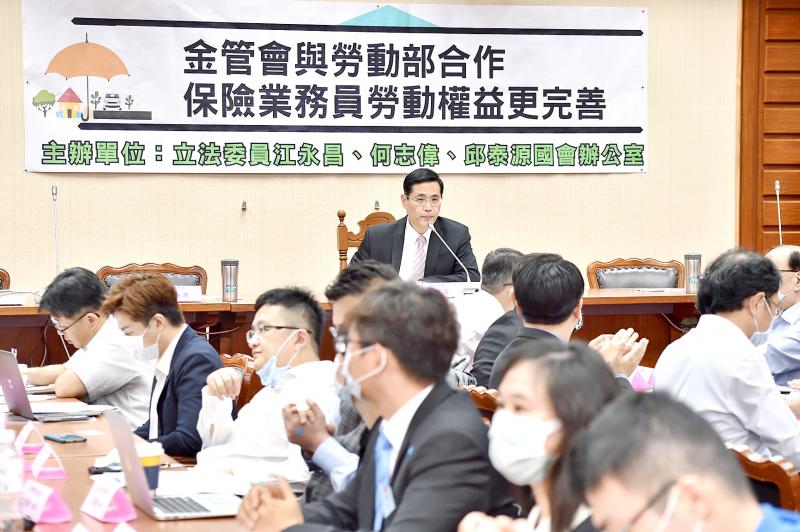Insurance agents and labor unions’ representatives yesterday criticized the Regulations Governing the Supervision of Insurance Solicitors (保險業務員管理規則) for giving too much power to insurance companies to penalize their sales agents.
The rules — aimed to prevent inappropriate marketing — allow companies to give rewards to or impose disciplinary measures on their agents, but firms have weaponized the rules and punished agents as they want, Republic of China Insurance Union Alliance director Chuang Ching-hsiang (莊敬祥) said at a public hearing at the Legislative Yuan in Taipei.
For example, Taiwan Life Insurance Co (台灣人壽保險), had punished agents for “disrupting order in the office,” while Mercuries Life Insurance Co (三商美邦人壽保險) required its agents to sign non-disclosure declarations and give up their legal rights, Chuang said.

Photo: Tu Chien-jung, Taipei Times
“Our colleagues were even fined for reposting media reports of Nan Shan Life Insurance Co’s (南山人壽) dubious transactions,” Nan Shan labor union president Tsai Kun-ying (蔡坤穎) said.
There are 380,000 agents in the nation, and most companies impose unreasonably strict disciplinary measures on them, alliance chairman Yan Ching-lung (嚴慶龍) said.
Companies can impose rules on their employees, according to the Labor Standards Act (勞基法), but most insurance agents are contracted workers and deserve fewer restrictions, Yan said.
The law also allows firms to cancel agents’ registrations, which prevents them from working in the industry for three years, he said.
“The rules are disproportional. Given that a mayor who is removed from office cannot run for election to the same office in three years, the punishment on an ordinary citizen should not be as severe,” Democratic Progressive Party (DPP) Legislator Mark Ho (何志偉) said.
The unions urged the Financial Supervisory Commission and the Ministry of Labor to work together to resolve the disputes.
Insurance Bureau Director-General Shih Chiung-hwa (施瓊華) said the commission would consider amending regulations to resolve the long-lasting disputes.
The commission would review as soon as possible the reports of unreasonable disciplinary measures, Shih said, adding that it would “consider whether the punishment of canceling agents’ registrations is too severe.”
“The disputes have existed for a long time, but we will not ignore them. We will fix them in cooperation with the Ministry of Labor,” she said.
DPP Legislator Chiang Yung-chang (江永昌) said the Insurance Act (保險法) should also be amended to be comply with labor regulations.

Taiwan will prioritize the development of silicon photonics by taking advantage of its strength in the semiconductor industry to build another shield to protect the local economy, National Development Council (NDC) Minister Paul Liu (劉鏡清) said yesterday. Speaking at a meeting of the legislature’s Economics Committee, Liu said Taiwan already has the artificial intelligence (AI) industry as a shield, after the semiconductor industry, to safeguard the country, and is looking at new unique fields to build more economic shields. While Taiwan will further strengthen its existing shields, over the longer term, the country is determined to focus on such potential segments as

UNCERTAINTY: Innolux activated a stringent supply chain management mechanism, as it did during the COVID-19 pandemic, to ensure optimal inventory levels for customers Flat-panel display makers AUO Corp (友達) and Innolux Corp (群創) yesterday said that about 12 to 20 percent of their display business is at risk of potential US tariffs and that they would relocate production or shipment destinations to mitigate the levies’ effects. US tariffs would have a direct impact of US$200 million on AUO’s revenue, company chairman Paul Peng (彭雙浪) told reporters on the sidelines of the Touch Taiwan trade show in Taipei yesterday. That would make up about 12 percent of the company’s overall revenue. To cope with the tariff uncertainty, AUO plans to allocate its production to manufacturing facilities in

COLLABORATION: Given Taiwan’s key position in global supply chains, the US firm is discussing strategies with local partners and clients to deal with global uncertainties Advanced Micro Devices Inc (AMD) yesterday said it is meeting with local ecosystem partners, including Taiwan Semiconductor Manufacturing Co (TSMC, 台積電), to discuss strategies, including long-term manufacturing, to navigate uncertainties such as US tariffs, as Taiwan occupies an important position in global supply chains. AMD chief executive officer Lisa Su (蘇姿丰) told reporters that Taiwan is an important part of the chip designer’s ecosystem and she is discussing with partners and customers in Taiwan to forge strong collaborations on different areas during this critical period. AMD has just become the first artificial-intelligence (AI) server chip customer of TSMC to utilize its advanced

Chizuko Kimura has become the first female sushi chef in the world to win a Michelin star, fulfilling a promise she made to her dying husband to continue his legacy. The 54-year-old Japanese chef regained the Michelin star her late husband, Shunei Kimura, won three years ago for their Sushi Shunei restaurant in Paris. For Shunei Kimura, the star was a dream come true. However, the joy was short-lived. He died from cancer just three months later in June 2022. He was 65. The following year, the restaurant in the heart of Montmartre lost its star rating. Chizuko Kimura insisted that the new star is still down